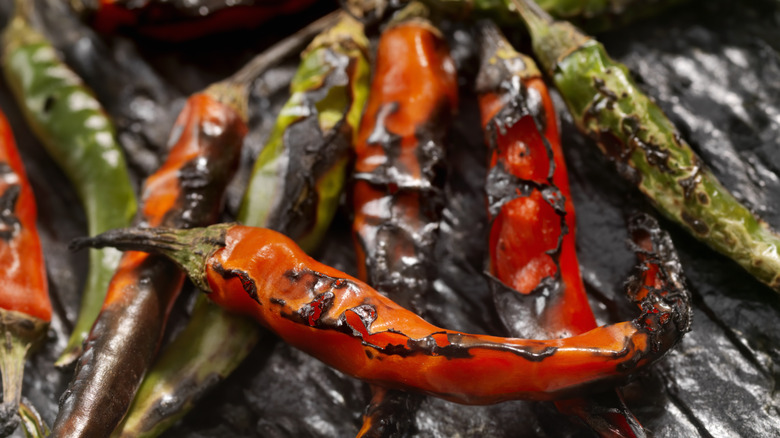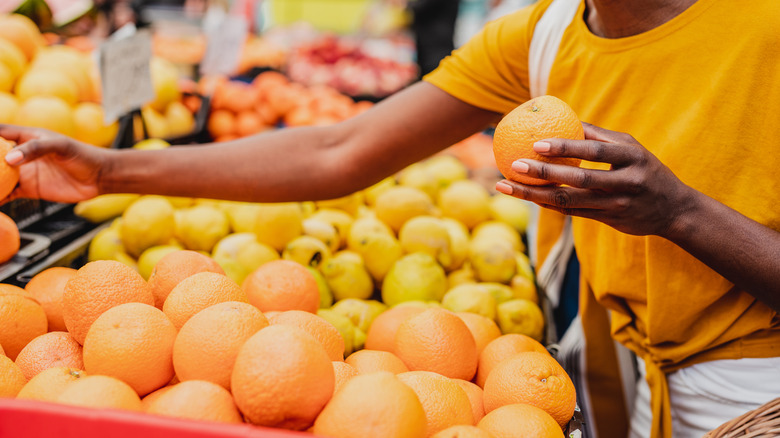The Four Worst Foods For Acid Reflux, According To Our Gastroenterologist
Previous research seems to have underestimated just how many Americans struggle with gastroesophageal reflux disease (GERD), which is associated with heartburn and acid reflux symptoms. One study, originally published in 2019 in the scientific journal Gastroenterology, found that out of 71,812 survey participants, over 44% reported having previously experienced GERD symptoms, while nearly 31% had experienced GERD symptoms within the last seven days.
In an exclusive interview with Health Digest, Dr. Kenneth Brown, renowned Plano, Texas gastroenterologist and host of the Gut Check Project podcast, explained what acid reflux is and what kinds of triggers — specifically, food items — can aggravate symptoms. "Acid reflux, also known as gastroesophageal reflux disease (GERD), occurs when stomach acid flows back into the esophagus, causing irritation and discomfort," he stated. "Certain foods can trigger or worsen acid reflux symptoms due to their impact on the lower esophageal sphincter (LES) and stomach acid production." Here are the four worst foods you may wish to avoid, according to Dr. Brown.
Spicy food items
Of the four worst kinds of foods known to exacerbate symptoms of acid reflux, the first is spicy food items. "Spicy foods, such as hot peppers, chili and curry can irritate the lining of the esophagus and trigger heartburn," Dr. Brown explained. "These foods may also relax the LES, allowing stomach acid to flow back up into the esophagus," he said. "For individuals with acid reflux, these foods can worsen symptoms and increase the risk of experiencing discomfort."
Capsaicin may play a partial role in this discomfort. Experts at Austin Gastroenterology explain that capsaicin, the compound responsible for chili peppers' hot sensations, reduces the body's speed of digestion. With food hanging out in our stomachs for longer stretches of time, this makes us more susceptible to heartburn symptoms. While this may be the case for those who only indulge in spicy foods every now and again, research from a 2010 study published in the Journal of Neurogastroenterology and Motility oppositely points out that regular consumption of capsaicin or chili has been linked with a reduction in GERD symptoms.
Fatty and greasy foods
Dr. Brown went on to tell Health Digest exclusively that fatty and greasy foods can also worsen acid reflux. "High-fat and greasy, fried foods, such as dairy products and fatty meats, take longer to digest," he stated. "This delays stomach emptying and increases pressure on the LES, making it easier for stomach acid to enter the esophagus. These foods can lead to prolonged acid exposure and exacerbate acid reflux symptoms."
Specific foods that fall into this category include pizza, potato chips, fast food, bacon, sausage, and cheese (via Johns Hopkins Medicine). Those diagnosed with GERD are encouraged to stick to whole-grain food items like oatmeal or brown rice. Green veggies can also be beneficial, including broccoli or asparagus. Root vegetables are also a safe bet for those who enjoy sweet potatoes or beets. And, as Dr. Brown mentioned, the fat content in milk can exacerbate acid reflux symptoms. However, nonfat milk may provide fast-acting relief.
Citrus fruits
While citrus fruit has many health benefits to offer us, it may not be the best choice for those who experience acid reflux. "Citrus fruits ... are acidic in nature," Dr. Brown told us. This is because citrus fruits — such as oranges, lemons, and grapefruits — have lower pH levels. The lower the pH level, the more acidic the food item (via Johns Hopkins Medicine). "Consuming these fruits can increase the acidity in the stomach, potentially leading to irritation of the esophagus and worsening acid reflux symptoms," he stated. "Additionally, citrus fruits may weaken the LES, making it less effective at preventing acid reflux."
However, this doesn't mean that all fruits need to be avoided. Instead, stick to fruits with higher water content or higher pH levels. This can include melons, bananas, or watermelons. Furthermore, although lemons are included in Dr. Brown's list of foods to avoid, lemon water may be a different story. A small squirt of lemon juice when combined with honey and warm water can offset the fruit's acidity, which may ease one's acid reflux symptoms.
Chocolate
There's one sweet treat that may also worsen acid reflux symptoms, Dr. Brown noted. "Chocolate contains a compound called theobromine, which can relax the LES and promote acid reflux," he says. "Furthermore, chocolate is often high in fat, which can also contribute to reflux symptoms. For individuals prone to acid reflux, it is best to avoid or limit consumption of chocolate."
Dr. Brown concluded his exclusive interview by offering some general tips for those with acid reflux. He pointed out that some people may react to these specific food items, while others may not. "If you suffer from acid reflux, it is beneficial to keep a food diary to identify which foods worsen your symptoms and make appropriate dietary adjustments," he stated. "Lifestyle changes like eating smaller meals, avoiding lying down immediately after eating and maintaining a healthy weight can help manage acid reflux symptoms." However, he emphasized that there are cases in which one should reach out to their physician. "If you experience severe or persistent acid reflux, it is crucial to consult your doctor for proper evaluation and treatment as GERD can cause more serious problems if left untreated."




